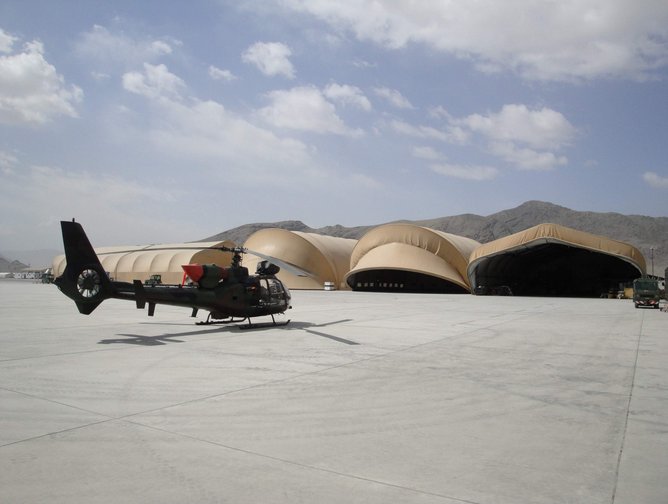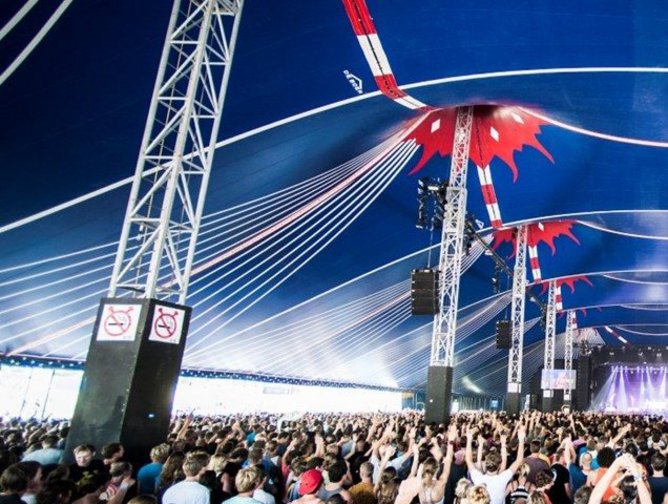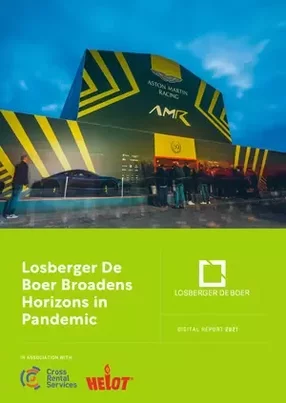I’ve been taken on a virtual round-the-world trip by Oscar Gersjes, Group Procurement Director at Losberger De Boer, as we hop from emergency shelters in Haiti and military camps in Mali, to the most well-known motorsports event in the world, a number of highly customized storage facilities and even find time in our one-hour Zoom meeting to discuss European cultural nuances.
The breadth of work underlines two key messages: the company’s global presence and ability to pivot in the pandemic, broadening its business alongside its core events expertise. Rapid Deployment Solutions (RDS), Commercial and Event buildings are its key sectors, with rental space and special projects accounting for the largest slice of turnover. Perhaps surprisingly, given its events exposure during the teeth of the crisis, 2020 came in above budget although 2021 projections are currently a little below forecasts – although he is confident it will close the year hitting targets. Major upcoming projects include large scale racing and golf events.
“Every change provides plenty of opportunities. At the moment there haven’t been many events but we’ve built a lot of commercial buildings in Europe, sport centres in France, and a wide range of medical facilities to help fight the pandemic all over the world, from temporary hospitals and triage centres to test and vaccination centres,” he said.
The global events supplier – whose long client list includes the Mobile World Congress, G7 and G8 meetings, NATO summits, Wimbledon, Tour de France, and the Farnborough Air Show – has chosen to invest in product innovation during the pandemic, in order to expand its role as industry leader in the events sector when events are completely back, as well as re-inventing its product portfolio to not only keep up, but stay ahead of the changing times.
Throughout 2020, the company has adapted its products to help the healthcare sector in dealing with the pandemic. Alongside healthcare professionals, a blueprint for an optimized temporary mass vaccination centre was developed, to allow large numbers of people to be vaccinated efficiently and safely. Structures that are normally used for events were transformed into triage centres or facilities that help businesses and institutions adapt to social distancing requirements, like temporary auditoria and canteens.
The company used this knowledge for the events sector as well, creating blueprints for ‘covid-proof’ events. For German kitchen giant nobilia, Losberger De Boer helped create a venue that could safely hold large numbers of people whilst complying with strict German covid-regulations. Tennis events like the Barcelona and Hamburg open were able to come back, partly because Losberger De Boer was able to adapt its facilities to meet the constantly changing restrictions. In case of the Porsche European Open in Hamburg, the entire venue was redesigned two weeks before the start of the tournament.
In terms of product development, the company has invested in innovation. Last year, it launched a structure that complies to the Eurocode, just like traditional buildings do, and that is still fully modular and adaptable, as well as quick to build. A new, lighter and highly sustainable flooring system was devised, as well as an innovative system that sets a new standard in terms of acoustics and insulation for events. In the final quarter of this year and throughout 2022, Losberger De Boer will introduce several new products as well as optimized parts for its existing structures. We speed onto Baku, where Losberger De Boer handled a challenging assignment for one of the largest racing events in the world.
“We had to strengthen the roof of the parking garage, and build on top of the columns, and they weren’t equally spaced. This was specifically for the race cars,” he said.
“There were supply issues too, with steel coming from Turkey, and wood from Latvia. We had major problems on the border – it was stressful as it was stuck for six days. It’s getting worse to source supplies. We try and change materials to more composites, they tend to be cheaper, lighter and environmentally friendly. The importance of weight reduction is getting more and more important.”
While much of its work is on site, it is adopting the hybrid model for office-based staff. “The pandemic made us realise you can create a lot of efficiencies and also understand the limitations of Zoom and Teams. Whether it’s discussing technical options, or negotiating big deals with customers – you have to go there and be on the same table.”
Today Losberger De Boer focuses strongly on Europe, Middle East and US, the latter presenting openings in the military sector. Sustainability is also providing untapped opportunities.
New energy sector opportunities
Companies such as TATA Steel are having big problems with external coal storage, and there is a good chance it will be forbidden – so you need huge structures to cover it, he adds.
“That’s a new area of business. We have done it in Asia, we have good partners in Spain and US. “There are a lot of areas where you can make a difference – we’re changing more from truck to train, looking to source lighter, and negotiating with companies to have environmentally friendly trucks. We have events equipped with solar panels, and at our military sites, we built a big camp in Mali, which will operate for two-to-three years. It can provide half of the camp’s total energy consumption.
The panels are getting better, ultimately we hope to provide camps with all their electricity through solar so there isn’t a need for external electricity anymore. That’s probably around two or three years away.”
He adds it is also working with big aluminium companies, and looking more to suppliers which can secure their own raw materials and have their own melting facilities, collaborating with a Turkish company and two Spanish suppliers.
Cross Rental Services is key service provider, which pick up smaller projects – Losberger De Boer delivers the materials and they build it – and Helop is one of its climate solutions companies, which is strong in Germany. Other leading supplier partners include NEDAL Aluminium, Richter Aluminium and Top Events Exhibition (Furniture/Rental).
Another big focus is modular structures, to extend its container business in Germany to markets such as the UK and Benelux, where housing shortages have led to high demand
“We deliver home offices in Belgium and the Netherlands, which has also seen a spur in demand with the pandemic. The units are separate to your house with high insulation systems, and we combine it in a lease strategy – people can lease a small electric car and combine it with a home office.”
Four years on from the merger, Gersjes, who joined De Boer as Procurement Director in 2006, describes the company as still “in transition”, which reflects the scale of the operation and challenges integrating its disparate entities. He concedes the merger “wasn’t smooth” but today, technology is helping improve efficiencies.
BOX Importance of good data
Everything starts with having good data, particularly when you’re working in different markets.
“If you want to have a clear, aligned strategy, you need a lot of data. We invested in a system called VendorLink, which we use for spend analysis, supplier contracting, certifications and e-signing, and we are also looking to extend it to include Vendor Rating. VendorLink has been invaluable to us for our procurement.
“We have looked for a single system for a long time, but have yet to find an ERP system that covers all these functionalities, at least how I like it. That was another issue with the merger, as companies had different systems, and we are going to work with SAP on integrating – it’s very easy to link with Vendorlink.”
“There are lot of interesting things with digital solutions. It’s important to make the right choice – you have to look at what will most add value. Big companies like Boeing and mobile operators want to see up front the result later on.”
In future, a Vendor Rating is cited as a priority, and new technologies will be embraced when needed.
“We are only in projects, so it’s essential we can rate quality. If the quality fails, costs go up considerably, and so that’s a key focus in the coming years.”



